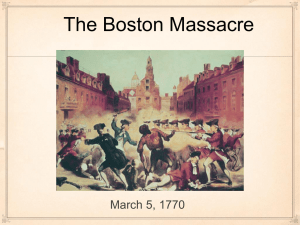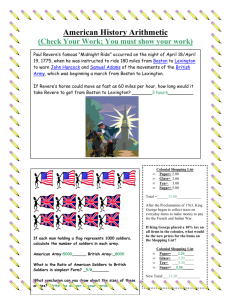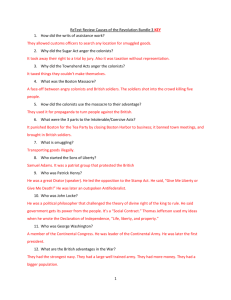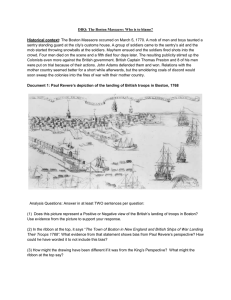Colonies and Revolution Lesson Plan
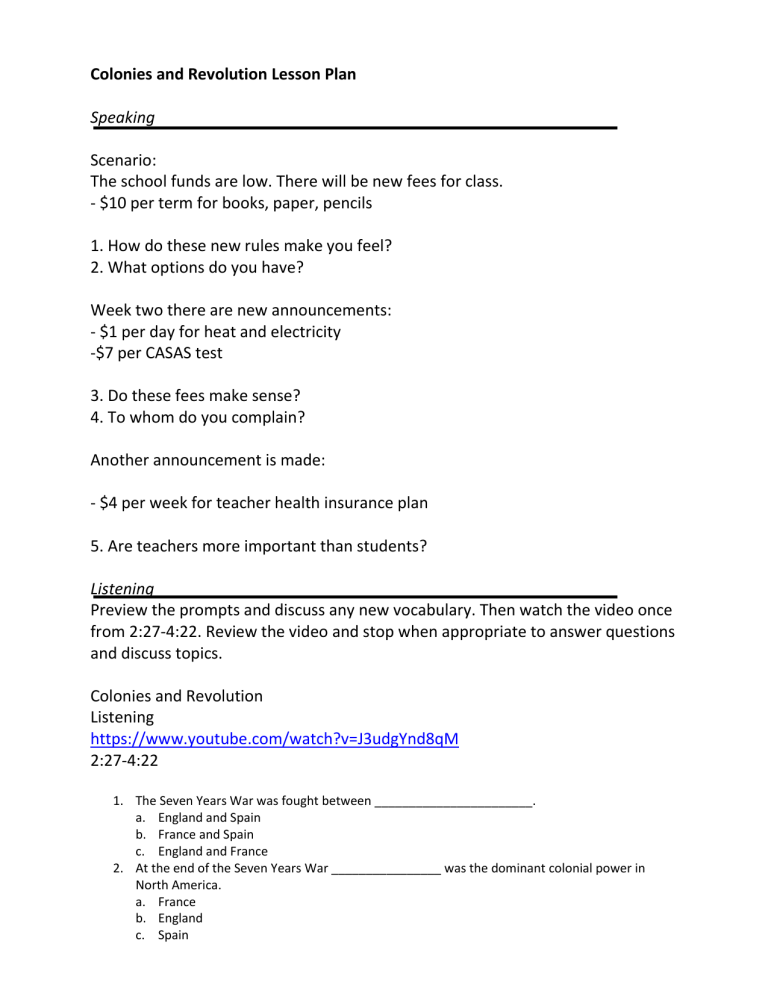
Colonies and Revolution Lesson Plan
Speaking
Scenario:
The school funds are low. There will be new fees for class.
- $10 per term for books, paper, pencils
1. How do these new rules make you feel?
2. What options do you have?
Week two there are new announcements:
- $1 per day for heat and electricity
-$7 per CASAS test
3. Do these fees make sense?
4. To whom do you complain?
Another announcement is made:
- $4 per week for teacher health insurance plan
5. Are teachers more important than students?
Listening
Preview the prompts and discuss any new vocabulary. Then watch the video once from 2:27-4:22. Review the video and stop when appropriate to answer questions and discuss topics.
Colonies and Revolution
Listening https://www.youtube.com/watch?v=J3udgYnd8qM
2:27-4:22
1.
The Seven Years War was fought between _______________________. a.
England and Spain b.
France and Spain c.
England and France
2.
At the end of the Seven Years War ________________ was the dominant colonial power in
North America. a.
France b.
England c.
Spain
3.
English colonists did not like the Stamp Act. It was a tax without their __________________. a.
constant b.
consent c.
continent
4.
British troops shot five civilians in the city of ___________________. a.
Boston b.
Philadelphia c.
New York
5.
Colonists showed their displeasure with English rule by throwing boxes of British tea into Boston
Harbor. This is known as the _____________________. a.
Boston Free Party b.
Boston Key Party c.
Boston Tea Party
6.
What triggered outrage in the thirteen colonies? a.
The Untouchable Acts b.
The Intelligible Acts c.
The Intolerable Acts
Reading
John Adams and the Boston Massacre
It was the most controversial case of its day — the defense of the British soldiers accused of carrying out what would come to be known as the Boston Massacre. Amid the outrage and fury that followed the shooting, which resulted in the deaths of five colonists, one young Boston attorney courageously took the case to ensure that justice was served.
The presence of British troops, who had occupied Boston since 1768 in an effort to put down resistance to the Crown’s policy of taxation without representation, had been a source of mounting tension in the colonial city. Things came to a head on the snowy evening of March 5, 1770 when a small group of Bostonians gathered to taunt a British sentry. As the crowd grew into a mob of hundreds, several soldiers under the command of Captain Thomas Preston came to the assistance of the besieged sentry. Rocks and snowballs were thrown and soon the soldiers opened fire. When it was over, three civilians lay dead at the scene with two more mortally wounded.
With a public enraged by what they saw as an act of brutality by their British occupiers, Captain
Preston and his men were indicted for murder by the colonial government. Because of the virulent anti-British sentiment in Boston, no lawyers in the city would agree to defend the soldiers, believing it would be the end of their legal careers. But John Adams, an outspoken critic of the British occupation, recognized the importance of a fair trial for the accused and agreed to represent them.
Adams later wrote that he risked infamy and even death, and incurred much popular suspicion and prejudice, for the sense of duty he felt to offer the British soldiers an adequate defense.
Of his decision to represent the British soldiers, Adams wrote in his diary:
"The part I took in defense of captain Preston and the soldiers, procured me anxiety, and obloquy enough. It was, however, one of the most gallant, generous, manly and disinterested actions of my whole life, and one of the best pieces of service I ever rendered my country. Judgment of death against those soldiers would have been as foul a stain upon this country as the executions of the
Quakers or witches, anciently.”
Captain Preston and six of his men were acquitted while two others who were convicted of manslaughter were sentenced to be branded with an “m” on their thumbs.
Grammar
Grammar In Context 2
5.5


